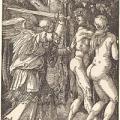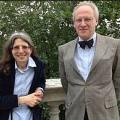199. Much Ado About Nothing: Eriugena's Periphyseon
Eriugena delves into the Greek tradition to produce his masterpiece of metaphysics and theology, the Periphyseon.
Themes:
• Eriugena, Periphyseon (The Division of Nature), trans. I.-P. Sheldon-Williams and J.J. O’Meara (Montreal: 1987).
• D.F. Duclow, “Divine Nothingness and Self-Creation in John Scotus Eriugena,” Journal of Religion 57 (1977), 109-23.
• J. Marenbon, “John Scottus and the ‘Catagoriae Decem,’” in W. Beierwaltes (ed.), Eriugena: Studien zu seinen Quellen (Heidelberg: 1980).
• D. Moran, The Philosophy of John Scottus Eriugena: a Study of Idealism in the Middle Ages (Cambridge: 1989).
• D. Moran, “Idealism in Medieval Philosophy: The Case of Johannes Scottus Eriugena,” Medieval Philosophy and Theology 8 (1999), 53-82.
• J.J. O’Meara and L. Bieler (eds), The Mind of Eriugena (Dublin: 1973).
• W. Otten, “The Dialectic of the Return in Eriugena’s Periphyseon,” Harvard Theological Review 84 (1991), 399-421.







Comments
Audience and circulation
Since we began the medieval Christian part of the podcast, one historical question bothered me quite a lot: how big was the audience these author were able to reach, and the circulation of their works? I know a precise answer is probably lost to history, but I would really like to know even the broad estimates of the size of philosophical community of the time. Is it possible that the people able to engage with and understand Eurigena's finest points numbered less than twenty, or is it way too pesimistic a guess? The idea of being a smartest man in ones oikumene and being positively sure of this fact is both fascinating and terryfing at the same time
In reply to Audience and circulation by Maciek Zając
Audience
Actually we can answer that question with a bit more precision than you might think because we can track the production of manuscripts down through the centuries - obviously that doesn't really give us a figure since we don't know how many readers each manuscript would have had, plus a lot of manuscripts would be lost. In this particular case, the Periphyseon is absolutely massive, so not easy to copy, and there are I believe only a small handful of manuscripts which incidentally show revisions, probably at the behest of Eriugena himself. We know of several readers in the immediate generations following him - episode 102 will actually touch on this. So, not a huge distribution. By contrast a work like, say, Isidore's Etymologies would have been in every good library in Europe and had thousands of readers in the 8th-9th centuries alone, I'm guessing. But you need a real manuscript expert to give you better answers; maybe one will add a comment here if we're lucky!
Thanks
Dear Peter (if I may),
As a fellow professor of philosophy and literature, let me be one of the many to 'thank you' for the HPWOG. As a student, my sole companion on the wonderful and fascinating trek through 2500+ years of western philosophy was Copleston. Great as his was, I do think that you're well on your way to wearing his shoes.
Again, many thanks, cheers, and keep up the incredible work,
Peter
In reply to Thanks by Peter Francev
Thanks
And thanks for writing in! Very glad you like the series.
Thank you for this! It…
Thank you for this! It helped me a lot in writing Eriugena's philosophy for my final exam this semester. I don't know why I ended up studying philosophy, and so far, I've been meaning to drop out because I've realized how hard it is to pass my major subjects. The discussions here help alleviate my workload. Please do not stop making wonderful content such as this!
In reply to Thank you for this! It… by Mary Gay
Eriugena
Great, glad it was helpful! I'm impressed that they are teaching you Eriugena.
nothing
very much enjoyed this episode. the four types of things mentioned in this episode reminds of the tetralemma.
listening to this episode on the speculation of "nothingness" is making me v excited for the upcoming series on chinese philosophy. i'm wondering if you will be covering the kyoto school as part of that? technically japanese, but drawing heavily on "wu" and chan buddhism.
again and again, thank you for the work on this podcast. and as buster keaton would say in his silent films... "(nothing)"
In reply to nothing by austin
Nothing much
Ha, nice Buster joke!
In the upcoming China series we will only do classical Chinese thought, so up to the time when Buddhism comes in but stopping there I think. I hope to do a whole series later on Japan and Korea though, which obviously would include the Kyoto school.
In reply to nothing by austin
In remembrance
"In the End, we will remember not the words of our enemies, but the silence of our friends." -- Martin Luther King, Jr.
Ex meh-ilo
If I were making these categories - and I know this isn't how classic philosophers thought - I would add a "sort of" category. So "Sort of created, doesn't create," etc down the Mendel chart. I feel like that would resolve a lot of things, eg "does the matrix of all matrices include itself?" "Sorta?" Would cover all nonbinary answers as well as things that are debatable or state-dependent.
I always think it's interesting when people (especially religious philosophers) take a word that seems to have a common-sense meaning and turns it into something very specific and, by strict definition, maybe not related to the original term at all. This is re: God creating things within himself using "wisdom" but I think there are better examples. Reading about Talmudic stuff, I see the same thing. I don't have a broader point... it's just kind of fun and funky, that's all.
I'm going to have to chew on this Christian version of what sounds like animism. Sounds kind of cool but also maybe a little too new-agey for Christianity to really get behind without yelling about heresy. (I'm sure it has precedence in other religious thought in some of your other series.) Very much like the "we are the universe experiencing itself" concept. I imagine if there's fallout to this work, you'll be telling us later.
The "super goodness" thing is sounding very Maimonides.
Whenever philosophy goes into math-sounding territory, that's the one time I'm like, "Yeah, that could work, I have no idea." The end of this episode is getting there for me. :)
Add new comment